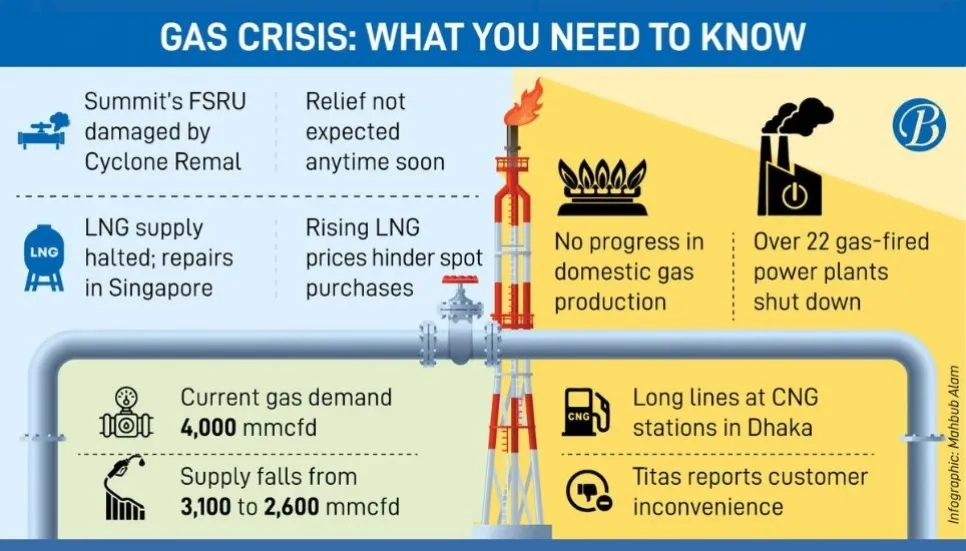
The ongoing natural gas crisis has severely affected power generation and industrial production while also causing stagnation at CNG stations. CNG-run auto-rickshaw drivers have been facing long waits to refuel, a situation that has persisted for over a month.
Authorities said that relief is not expected anytime soon, with improvements anticipated by mid-July.
Gas supply down due to Remal damage
According to the RupantaritaPrakritik Gas Company Limited (RPGCL), one of the two Floating Storage and Regasification Units (FSRU) of Summit LNG Terminal Co. (Pvt) Limited in Maheshkhali, Cox's Bazar, was extensively damaged when cyclone Remal hit the coast of Bangladesh in May.
Since then, LNG supply from the terminal has been halted. Efforts to repair the FSRU locally failed, and it was sent to a dockyard in Singapore for repairs in mid-June.
RPGCL reports that before the Summit FSRU was damaged, the country was supplied with 3,100 million cubic feet per day (mmcfd) of gas. Currently, the supply has decreased to 2,600 mmcfd.
RPGCL's Managing Director Engineer MdRafiqul Islam told The Business Post on Monday that the Summit’s FSRU is expected to return to the country by mid-July. Until then, there is no possibility of the gas crisis abating.
Rising LNG prices complicate supply issues
Petrobangla sources said that the current gas demand in the country is approximately 4,000 mmcfd, but only 2,600 mmcfd is being supplied, including 600 mmcfd of imported LNG.
According to international media reports, the price of LNG in the global market is rising, making it difficult for Bangladesh to purchase LNG from the spot market. Therefore, even if the Summit’s FSRU returns, there are concerns about the feasibility of importing LNG due to high prices.
Previously, in 2022, the government temporarily halted purchasing LNG from the spot market due to high prices, resulting in a severe gas crisis in the country. Despite various initiatives to increase domestic gas production, no visible progress has been made.
Long waits at CNG stations
A visit to various areas in the capital on Monday revealed long lines at CNG stations, despite the rain. Drivers reported that for the past month, they have been unable to obtain more than Tk 120 worth of gas, with half of it being air. What used to be a single refuel lasting all day now requires two to three refuels per day, with wait times of two to three hours.
At the ST Power Limited refuelling station in Uttar Badda, a long line of vehicles waiting for gas caused severe traffic congestion near Kuril Bishwa Road, affecting surrounding areas, including Shahjadpur. Frustrated drivers struggled to get the gas they needed to run for the entire day, despite waiting in line for hours.
Pickup van driver Anwar Miah said, "I have been waiting in line on the road, and sometimes the traffic police ask us to move due to the traffic jams we are causing. The line hardly moves. Because of these issues, we have all had to come for gas two to three times a day over the past month."
Low gas pressure
Refueling station operators are also struggling with low gas pressure. They reported a decrease in sales due to the gas shortage and are finding it difficult to manage the daily long lines at the station.
MostafaZaman, owner of Zaman CNG Filling Station in MerulBadda, said, "For the past two weeks, the gas pressure has been low from 7 am to around 3-4 pm. It is low almost all day. Daytime is our prime business time, but no one can explain why the gas pressure is so low."
Engineer MdSalimMiah, general manager in the Operation Division of Titas Gas Transmission and Distribution PLC, recently told The Business Post, "We are not receiving gas in the quantities required to meet demand, resulting in inconvenience for all our customers."
Meanwhile, the Bangladesh Power Development Board (BPDB) reports that over 22 gas-fired power plants have been shut down due to the gas crisis. Additionally, manufacturing industries are frequently reporting disruptions in production because of the gas shortage.